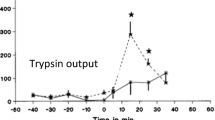Peptide YY (PYY) is secreted as a 36 amino acid, straight chain polypeptide, and is found in greatest concentrations in the terminal ileum, colon and rectum. After secretion, dipeptidyl peptidase IV (DPP-IV) cleaves the N-terminal Tyrosine-Proline residues from PYY(1-36), producing PYY(3-36). PYY(1-36) acts at all four human Y receptors, Y1, Y2, Y4 and Y5, while PYY(336) is a specific Y2 receptor agonist. PYY participates in the regulation of appetite and weight balance through hypothalamic-based mechanisms. PYY(1-36) stimulates appetite and weight gain through Y1 and Y5 receptors. PYY(3-36) suppresses appetite and stimulates weight loss through Y2 receptors. GI diseases that cause malabsorption increase both basal and meal-stimulated PYY levels. In contrast, obesity decreases both basal and meal-stimulated PYY levels. Mutations in the human PYY and Y2 receptor genes may contribute to the development of obesity. Small bowel resection elevates PYY levels in humans. Colon resections increase PYY levels in animal models but not in man. PYY changes following bariatric operations are incompletely studied. Vertical banded gastroplasty, open Roux-en-Y gastric bypass and jejunoileal bypass significantly elevate basal and meal-stimulated PYY levels. In dogs with Pavlov pouches, Roux-en-Y duodenojejunostomy (duodenal switch) increases PYY levels compared to Roux-en-Y gastrojejunostomy. DPP-IV activity is increased in obese individuals and remains increased after biliopancreatic diversion. Thus, diseases or operations which cause malabsorption, elevate basal and meal-stimulated PYY levels. Bariatric operations also increase basal and meal-stimulated PYY levels. This suggests that the combination of increased PYY levels and elevated levels of DPP-IV observed after bariatric operations may generate increased circulating levels of PYY(3-36), leading to hypothalamic-mediated suppression of appetite and promotion of weight loss through Y2 receptor mediated mechanisms.
Similar content being viewed by others
Author information
Authors and Affiliations
Rights and permissions
About this article
Cite this article
Ballantyne, G.H. Peptide YY(1-36) and Peptide YY(3-36): Part II. Changes after Gastrointestinal Surgery and Bariatric Surgery: Part I. Distribution, Release and Actions appeared in the last issue (May 2006). OBES SURG 16, 795–803 (2006). https://doi.org/10.1381/096089206777346619
Published:
Issue Date:
DOI: https://doi.org/10.1381/096089206777346619




